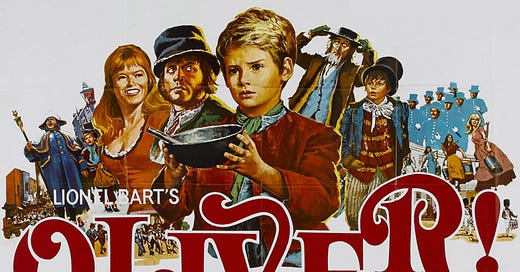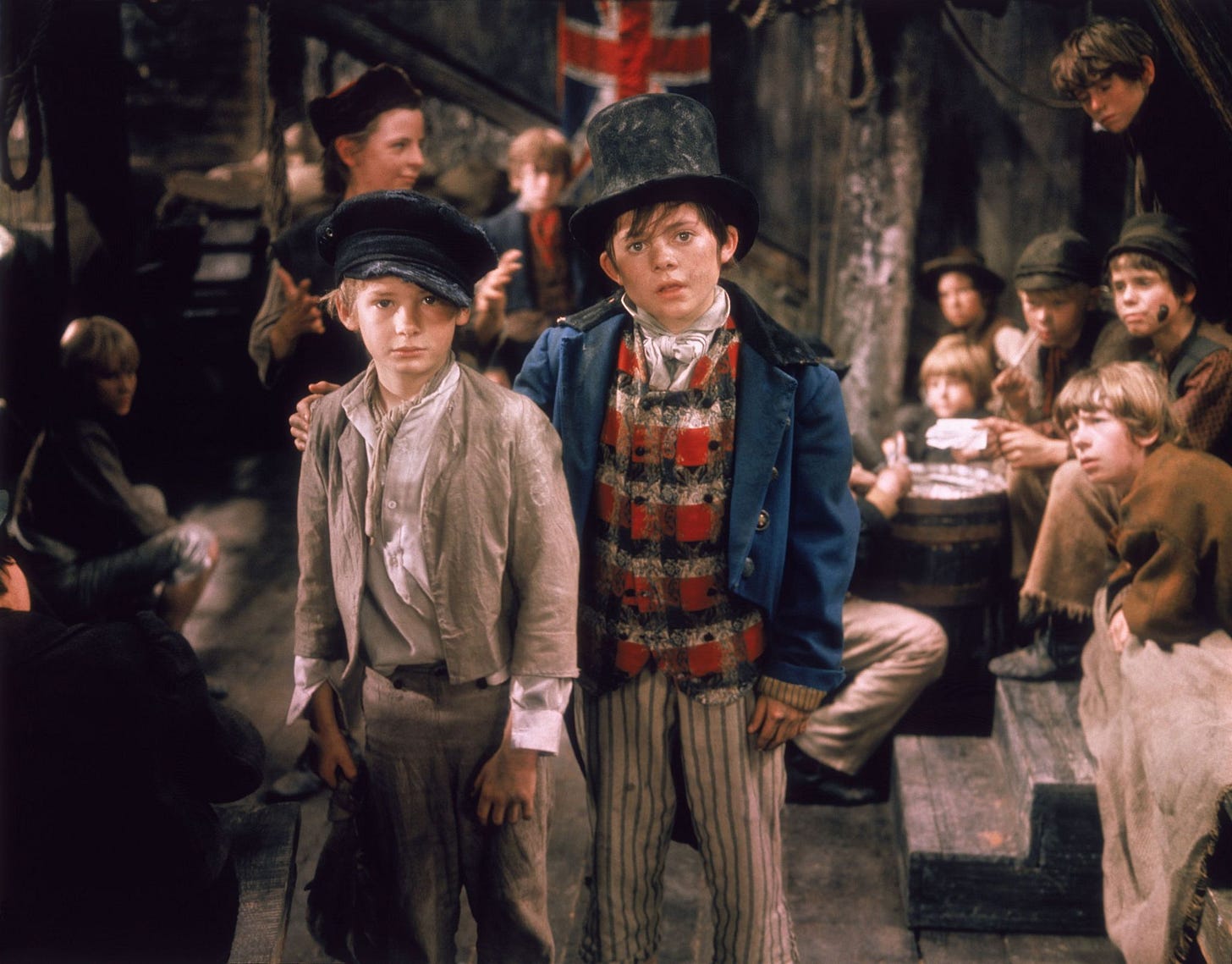Reeling Backward: Oliver! (1968)
The last gasp of the big Golden Age Hollywood musical, "Oliver!" is a delightful throwback to a more innocent age of cinema.
This lookback column is free for everyone. Please consider supporting Film Yap with a subscription!
For much of Hollywood history, it was fairly common for musicals to be recognized with Oscars, including Best Picture. There were four in the 1960s alone: “West Side Story,” “My Fair Lady,” “The Sound of Music” and “Oliver!” The latter, in 1968, would be the last to do so until “Chicago” in 2002, the 10th and only Best Picture musical in the last half-century.
It is strange to think about movies like “Oliver!” and “The Sound of Music” being so popular and lauded during a time of cultural upheaval and increasing cinematic risk-taking. Today they register as almost reactionary award choices.
Just a year before, “In the Heat of the Night” took the top prize at the Oscars, besting fellow nominees “The Graduate” and “Bonnie and Clyde” — all true next wave pictures.
For 1968 the competition for “Oliver!” was “The Lion in Winter,” “Rachel, Rachel,” “Romeo and Juliet” and “Funny Girl.” Fine films, but rebellious risk-takers they are not.
I prefer to look upon these 1960s musicals as the last gasp of Golden Age Hollywood, when studios unabashedly made affirming movies the entire family could enjoy. The industry was finally changing after decades of strict studio control — ultimately for the better, I think.
These Best Picture musicals stand as the old guard holding the door just a bit longer against the horde of rebels who would usher in a new era of darker, more intimate filmmaking that would reach full bloom in the ‘70s.
The film was an adaptation of the popular stage production by Lionel Bart, itself a work “freely adapted” from Charles Dickens’ 1838 novel, “Oliver Twist,” about a pauper orphan and his journeys betwixt the highs and lows of Industrial Age London.
I won’t attempt a detailed summary of the plot, since the novel has been a popular piece of fiction for nearly 200 years with multiple cinematic adaptations.
(The titular exclamation mark, with its stubborn extraneousness, seems like an attempt to liven up moldy material.)
Suffice to say that Oliver (Mark Lester), a boy of about 8 with a genteel disposition, is booted from the orphanage for the impertinence of asking for “more” of their miserly food portions. He escapes from servitude in an undertaker’s shop, falling in with a boy band of thieves led by Fagin (Ron Moody), an aging father figure/fence.
After being charged with pick-pocketing, Oliver is taken in by Mr. Brownlow (Joseph O’Conor), the kindly wealthy widower who had his wallet stolen by Jack Hawkins, aka the Artful Dodger (Jack Wild), the best boy in Fagin’s gang. This brings the deadly suspicion of the brutish thief Bill Sikes (Oliver Reed), who is afraid Oliver will “peach” (blab) to the authorities about his and Fagin’s criminal enterprise.
It was one of Reed’s first major screen roles, and he was suggested for the part without the knowledge that he was the nephew of director Carol Reed. Most of the rest of the cast were relative unknowns, with few carryovers from the stage production.
Fagin is, of course, seen as all kinds of “problematic” nowadays — and was so even in 1838. An explicitly Jewish character in the original printing, he was attacked as an antisemitic caricature, and not without reason. Dickens removed any reference to Jewishness in later printings.
As depicted in the screenplay by Vernon Harris and played with sly charisma by Moody, Fagin is a much kindlier and even pathetic figure than the book. He calls the boys “My dears,” providing them a home and training in a trade, if an overtly illegal one. Fagin has been saving the best loot for himself for years, stashing it in a chest hidden in a brick wall, his “treasure” he intends to use for retirement.
Fagin gets one of the best songs, “Reviewing My Situation,” where he contemplates going on the straight-and-narrow, though he always falls back into his schemes. He is sentenced to death by hanging in the book but gets a much rosier send-off in the movie, essentially rebooting his gang with the Dodger as his junior partner.
Like a lot of musicals, “Oliver!” rises or falls on the back of the songs, which are generally quite good if a bit dated to modern ears. “Consider Yourself,” the ensemble piece introducing Oliver to the gang, is a jaunty joy, taking three weeks to shoot. Lester sings in a sweet, angelic voice in solo tunes like “Where Is Love?” or part of a group piece — “Who Will Buy,” “I’d Do Anything.”
The movie starts almost entirely as musical scenes barely interrupted by dialogue, though there’s less singing and more dramatic sequences in the second half.
One song that didn’t land well with me is “As Long As He Needs Me” by Nancy, Bill’s much-abused lover, in which she reaffirms her commitment to him despite his ongoing mistreatment. A former student of Fagin, Nancy is now a prostitute who tries to protect Oliver as much as she can while doing Bill’s bidding.
Obviously the sentiment of a woman knuckling under her abuser doesn’t play well in 2022, though my objection to the song is that it simply isn’t a very memorable tune, coming off sappy and generic.
Played famously by Georgia Brown in the West End production of “Oliver!”, the film role went to Shani Wallis, who I thought did a fine job with her strong voice. I liked that Nancy isn’t a fresh-faced ingenue, needing some measure of years and weariness to underscore her plight.
“Oliver!” is in a lot of ways a captive of its times, both the 1960s and 1830s. The eponymous character maintains the habits of his good breeding despite his low circumstances, a common theme among class-obsessed Brits of the time.
Oliver himself is something of a cipher, the bland straight man whose upstanding ways stand out among the much more colorful figures surrounding him. You could almost imagine a version of “Oliver Twist” in which Oliver himself is written out of the story.
I enlisted my boys to watch “Oliver!”, a rare circumstance these days where the entire family watched a 2½-hour movie in one sitting. I worried it would be too old-fashioned for them (and me), but I’m pleased to say we all enjoyed it. My 11-year-old even imitated some of the high-stepping dance moves over the closing credits.
It won five other Oscars besides Best Picture, including director for Carol Reed, art direction, sound and musical score (by Johnny Green, separate from Bart’s songs and lyrics), plus an honorary Academy Award for Onna White’s choreography. It also had six other nominations, with both Moody and Wild getting acting nods.
Does it deserve to stand throughout time as a Best Picture? Maybe, though I’d definitely put it in the shallower end of the pool of winners. But it’s hard to argue against the tremendous production values and universal entertainment bonafides.
“Oliver!”, by the way, marks the latest step in my (admittedly sporadic) quest to columnize all the Best Picture winners I had not previously seen. I still have nine to go, which seems an ordinate number for a film critic at this stage of their life/career. I’ll try to be more diligent.







Regards the sing As Long As He Needs Me, which I do like, I was interested to see it was apparently written by Lionel Bart in the late 1950's. The tune shares a striking similarity to the theme from the 1955 film 'Summertime' set in Venice, and possibly had Italian lyrics/origin. The tunes sound identical to me...